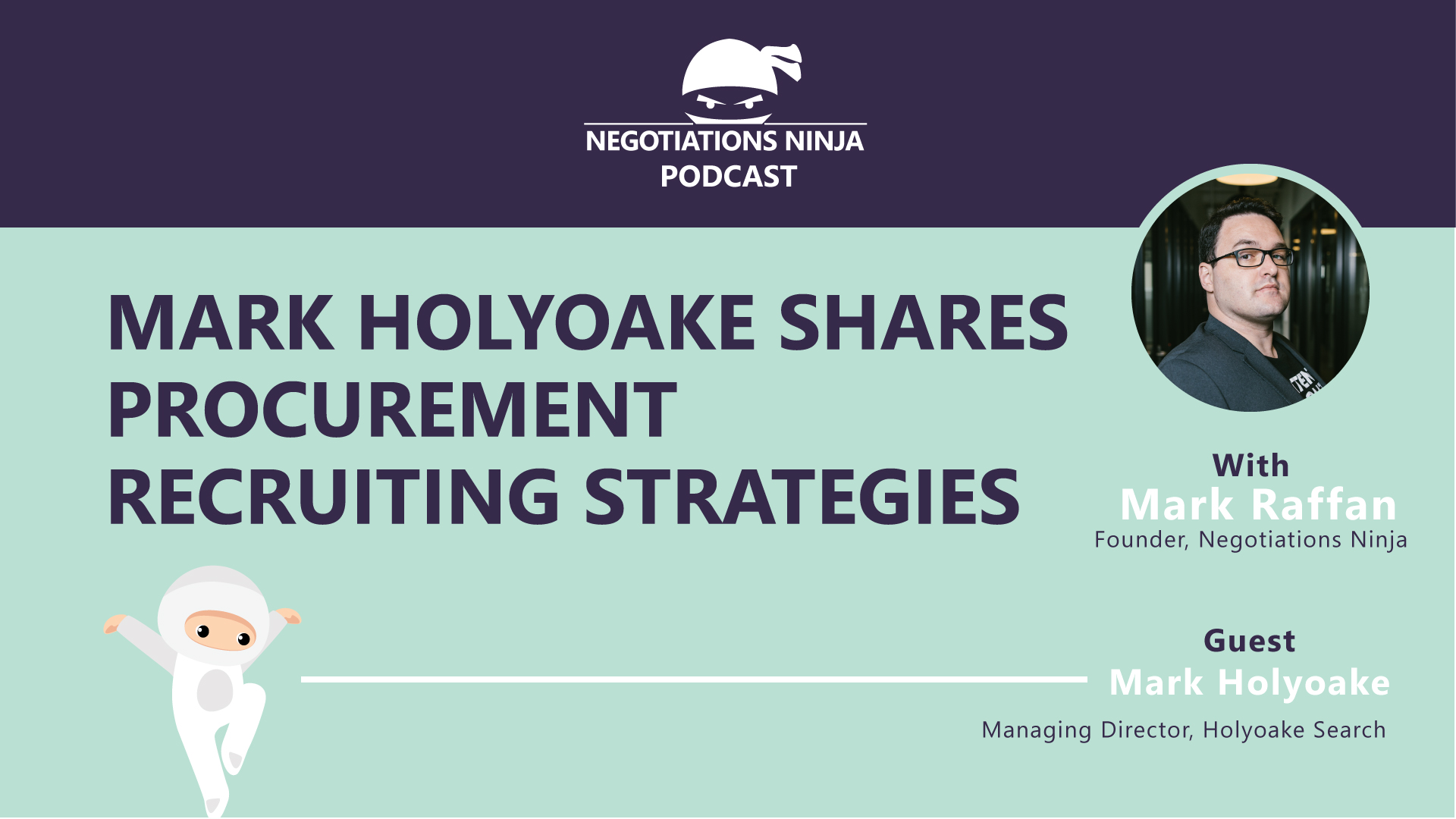How do you identify good candidates and secure them in a way that makes everyone happy? How should hiring managers and candidates approach the salary negotiation conversation? Does hiring leverage still exist? Mark Holyoake from Holyoake Search joins me to have a conversation about the state of procurement recruiting. Mark specializes in procurement executive search and contract staffing. He’s US-based and has worked in the industry for 20+ years. His unique view of the procurement market brings remarkable insight to the conversation. Don’t miss it!
Outline of This Episode
- [1:43] Mark’s background in procurement recruiting
- [3:10] Where the market is for procurement
- [8:04] The mindset around hiring leverage
- [12:19] How to prepare for a candidate negotiation
- [15:37] Where does Mark’s advice land?
- [18:07] Does personal branding matter?
- [21:50] The salary negotiation conversation
- [28:11] How to connect with Mark Holyoake
Has the procurement market really changed?
Where are things going? What is changing? We are 7 months into COVID-19 and the market has changed at a macro level—but not in the ways that people think. Mark points out that there are two competing narratives right now. The first is that people have been laid off or furloughed. There is a decrease in the number of people hiring, so some managers are trying to take advantage of this. They’re either trying to recruit people they wouldn’t normally have access to—or they’re trying to game the system and pay people less. They’re trying to be opportunistic and want director-level talent for manager-level money.
The second point of view—which Mark admits may sound self-serving—is that things haven’t changed all that much since the beginning of the year. From his viewpoint, procurement as a function has taken on an elevated status, now more so than ever. Supply isn’t quite as free and easy as you might think.
Companies are starting to hit the “play” button again and the market is getting crowded. People are throwing up job ads expecting an incredible and high-quality response. They’re getting volume—but have to weed out the mass of unqualified people who are applying to anything and everything. Meanwhile, qualified people are getting snapped up quickly.
The narrative would have us believe there’s heaps of labor available and that just isn’t the case. The talent is still finite and companies will quickly move back to having to face a challenge to find the right fit.
Do you really have leverage?
Mark points out that the interviewee has to consider when leverage matters. Decisions around hiring—title, salary, benefits—are often made at a group level. That’s particularly the case in larger companies. HR has a say. It’s not just up to the hiring manager. Where a group decision exists, there’s only so much you can do to move the needle. These companies won’t go outside of certain parameters.
The false narrative is that leverage has gone out the window. That people are lined up to take the job if you don’t. But Mark believes that many of these companies’ survival depends on the difference between a good hire and a poor hire. He points out that spending extra to hire the best person that they can is worth it.
Procurement people drive cost out, minimize non-compliant spending, protect them against vendor risk, and drive innovation through that supplier base. He believes that leverage comes from confidence. You’re a stronger fit based on your professional experience.
How to prepare for a candidate negotiation
How do you prepare to make an offer? What mindset or strategy must you embrace? What documents do you need? Mark points out that, firstly, you do need to prepare. Procurement people love to negotiate and it’s what they do for a living. They expect and even prefer to negotiate their salary and you should prepare for that.
Most candidates he’s worked with care more about not leaving money on the table. They want to achieve what’s available. So for their sake and yours, be fair and consistent. Mark advises being transparent because it breeds trust. For those that ask too little—acknowledge that the cost of replacing that person will cost you more. Start off on the right foot and bring them in feeling valued.
If the final salary hinges on this single high-stakes negotiation then you’ve gone about it all wrong. Mark emphasizes that you must start the conversation before you whittle down to a shortlist. Get the candidates to be candid about what they expect and make sure you reciprocate.
Mark believes that the gap between the highest and lower performers is even bigger at the manager or director level. You’ve accomplished a great deal and are promoted based upon your performance and your results. Finding a good versus great analyst is harder to discern.
If a candidate has confidence and they’re good at what they’re doing, they’re worth your weight in gold. A $5,000–$10,000 salary difference means far more to the individual than it does to the hiring company.
What should a hiring manager do to prepare for a salary negotiation? What should a candidate expect and strive for? How does personal branding impact hiring decisions? Mark and I continue this fascinating conversation in this episode. Make sure you listen!
Resources & People Mentioned
- Institute for Supply Management (ISM)
- Mark’s Article: Talent Acquisition in the ‘Next Normal’
- Andrew MacAskill on LinkedIn
Connect with Mark Holyoake
- Holyoake Search
- Connect on LinkedIn
Connect With Mark
- Follow Negotiations Ninja on Twitter: @NegotiationPod
- Connect with Mark on LinkedIn
- Follow Negotiations Ninja on LinkedIn
- Connect on Instagram: @NegotiationPod




